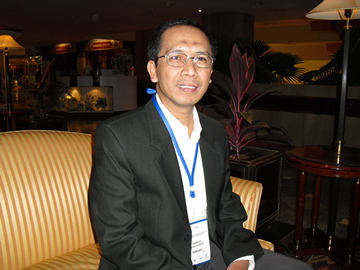Interview with Prof. Dr. Thomas Djamaluddin Senior Researcher on Astronomy and Astrophysics Head of Center for Application of Atmospheric Science and Climate National Institute of Aeronautics and Space (LAPAN), Indonesia

27 January 2010, APRSAF-16
Could you give us your general impressions of APRSAF-16?
I have participated in the forum since APRSAF-12 in 2005. I think each working group in the forum has made progress. In addition, it seems that collaboration between Asia-Pacific countries in the field of space is growing.
What are your specialities/ background?
My background is astronomy. I am currently working as a researcher in space science and also as Head of the Center for Atmospheric Science.
Could you tell us about activities in Indonesia related to Space Environment Utilization (SEU)?
I’m in the SEUWG (Space Environment Utilization Working Group). The main focus of this WG is making proposals concerning space environment utilization, taking into consideration how best to utilize the Japanese Experiment Module “Kibo”.
In 2005, during APRSAF-12, it was proposed that JAXA would provide an opportunity for the Asia-Pacific countries to propose simple experiments. So, I announced this to Indonesian researchers, and one candidate was selected for amongst a number interested, who proposed conducting ‘banana ripening’ in microgravity. We have done some feasibility studies and some ground experiments at the JAXA facilities in Tsukuba. The last experiment was conducted in September-October 2009. We hope that these simple experiments can be conducted at the Kibo facilities, of course, after examining the technical possibilities for preparing for this sort of experiment. This is just simple experiment. We hope that this experiment be done in microgravity conditions, and that samples can be analyzed.
How would you like APRSAF or JAXA to promote international cooperation within the field of space environment utilization in the Asia-Pacific region?
For APRSAF to get Asian countries involved in simple space experiments using Kibo facilities. This would be very interesting. This is also very important for capacity building in the region. Notably, simple experiments at the Kibo facilities would encourage potential researchers in the Asia-Pacific countries to promote space science and also use space facilities to do experiments in microgravity conditions. In Indonesia, microgravity science is a new field, so we are learning about microgravity conditions and proposing simple experiments. If we have a chance to conduct such space experiments, it will be very important for enhancing our capacity.